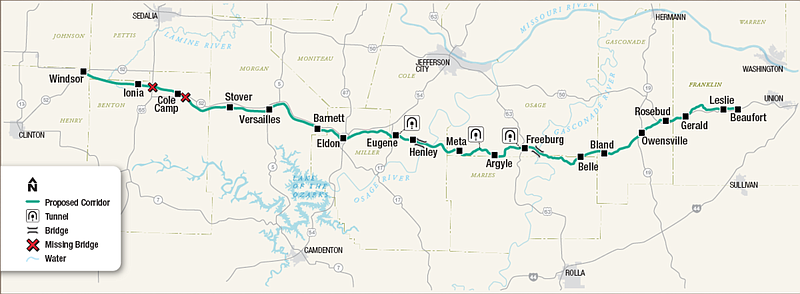The Rock Island Trail project is on track to meet a Dec. 31 deadline to raise enough money to fund the planned rails-to-trails initiative, Missouri State Parks Executive Director Mike Sutherland said last week.
Missouri State Parks signed an interim trail use agreement in December 2019 with Ameren and its subsidiary, Missouri Central Railroad Company, which donated the 144.3-mile Rock Island Line Corridor to the state for the development of a trail. The agreement gives the Missouri State Parks Foundation until the end of this year to raise $9.8 million for the Missouri Department of Natural Resources to take ownership of the corridor.
The section was formerly part of the Chicago, Rock Island and Pacific Railroad that runs from Windsor to Beaufort.
A national act established a process called "railbanking," where a railroad company and trail agency can use out-of-service corridors as a trail. Sutherland referenced the Katy Trail as an example of another "rails-to-trails" project, as it was once a rail corridor.
Once the $9.8 million is raised, the agreement will kick in and DNR can start working on the Rock Island Trail.
Sutherland said they have received continual support, even through the COVID-19 pandemic, although he did not discuss specifics on where they are monetarily.
"Certainly, we're all diverted a lot of energy to dealing with the pandemic," he said. "That may have changed things a little bit, but there's still been a lot of work going on. That support has continued, among the general public and people along the corridor."
Sutherland and Ron Bentch, project director for Missourians for Responsible Transportation, discussed details about the project and how the public can offer support during a Feb. 25 virtual event hosted by BikeWalkKC.
Once the trail is developed, it will connect the 47.5-mile Rock Island Spur in Windsor, which connects to the Katy Trail. This would create a 450-mile loop around Missouri - something Bentch said would be "probably the coolest thing on the planet when it comes to a trail loop."
"Currently, different things (are happening) in phases," Sutherland said about trail development in various parts of Missouri. "If everything gets connected, the user could go through and experience all of it."
Sutherland said the possibility of connecting Kansas City, St. Louis, Columbia and Springfield, along with small towns along the trail, would be an exciting opportunity for the state. The Rock Island Line Corridor would offer key connections to those opportunities.
Connecting the corridor to smaller trails that go through the center of Missouri towns can bring trail-goers to restaurants, shops and experiences within each town, boosting their economy. Bentch noted many towns on the corridor have already started preparing restaurants and camping areas that can cater to guests once the corridor becomes official.
"It won't just impact those towns but the entire state," he said. "We believe it's going to be a huge boom for those towns. The railroad went out in the early '80s, so a lot of towns have been struggling and see this as something beneficial."
Sutherland said it would impact Missourians' quality of life as well. Creating a safe place to walk your dog or with your children and attracting more homeowners and businesses to an area would improve property values.
When asked about the environmental benefits of the trail development, Sutherland said it won't be quite like Katy Trail due to its size - some parts of the corridor can be 100 feet wide, while others are narrower - but it can offer access to natural resources like conservation areas.
He said it comes back to the three-part mission of state parks: recreation, cultural preservation and natural resources.
"Where those opportunities exist, surely we would explore them," Sutherland said. "While those might be more limited, we still try to incorporate all three of those missions when we can."
Once the trail is accepted, Bentch and Sutherland said they'd look to individual towns to help develop their own sections, adding their own "mark of character" to already established state regulations. Funding will be a large part of this process, which communities would help with.
Bentch and Sutherland said those interested in the project can help by continuing to cultivate enthusiasm about it.
Sutherland said they've received support from philanthropic organizations and the state Legislature through the Rock Island Endowment Fund, so the important next step is funding to make the project happen. With 91 locations in Missouri State Parks, he said, donors will be crucial in funding what could become a more expensive project down the line.
"As trail users and people that love biking across the state, this is something we really need to grab hold of and support," Bentch said. "It would allow people from around the world to be drawn to Missouri. I know we're a little ways from that, but we're not far from seeing that become reality. We feel like this is an opportunity we can't afford to lose in our state."
To learn more about the Rock Island Trail project, visit mostateparks.com/rockisland corridor. Missouri Rock Island Trail Inc. is also supporting fundraising and can be found at rockislandtrail.org.

